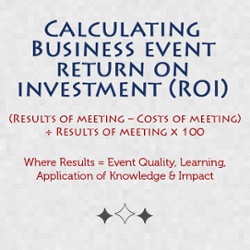
Business events are a great chance for companies and organizations to market themselves to a wider audience and also provide a platform for networking. Contacts gained through such events can lead to greater sales and profits for the business. This is why companies in the US easily spend over $300 billion annually on events. Yet, many of them are unable to accurately calculate the return on investment (ROI) of their business events. As they are spending a considerable amount of money on organizing the event, it is only prudent to assess whether they gained anything from it or not.
What is ROI?
The first thing you need to understand is what ROI is. As the term suggests, it is the return on investment. It is basically the difference between the money you earned through the event and the money you invested. Of course, you aren’t selling your products at the event so this is not a straightforward calculation. Rather, there are various factors you need to take into account to reach a definite and reliable figure. You can use this simple formula to calculate ROI:
(Results of meeting – Costs of meeting) ÷ Results of meeting x 100
Why is Event ROI Important?
Before moving on to how you can calculate ROI, let’s look at why it is important in the first place. As mentioned in the beginning, a business spends a considerable sum of money on holding the event. Hence, they need to judge whether the event was profitable for them or not. More significantly, in tough financial times, businesses need to make a decision on whether they should be holding such events. When money is tight, event budgets are usually the first to get cut.
On the surface, cutting your event budget may seem like the right thing to do, but what if your events are providing three or four times return on investment? Then, it does make sense to spend money on them even if your business is strapped for cash. So, you can see that ROI is an important figure, one which could have an impact on the success of your business. If you feel the ROI is not satisfactory, you can take measures to improve it, one option being hiring an event planner to help. Alternatively, you might decide against holding such events for the near future.
How to Calculate Event ROI?
One of the foremost methodologies related to measuring ROI of business events was put forward by Jack Phillips. As described above, it is not a straightforward calculation and that is what Phillips highlights in his theory as well. He has laid out five different levels on which the ROI has to be measured for a business to reach an accurate figure. Here is an overview of the five levels of calculating the ROI of business events.
Event Quality
The first factor to take into account is how the event went. Did it go according to plan? Was the audience satisfied? Was the venue and location arranged perfectly? Were the speakers insightful?
Learning
The objective of any business event is that the attendees learn something through it. You need to assess whether the event fulfilled this objective as well. In some ways, this is related to the overall quality of the event.
Application of Knowledge
The third level of measurement is whether the attendees actually applied what they learned in the event. Otherwise, the event went to waste. If you teach the participants how to do something and they don’t do it that way, your money went down the drain.
Impact
Did the application of knowledge have a positive impact on your company’s objectives? You have to measure this in light of what you set out to achieve with the event in the first place.
Conversion
Finally, you have to convert the impact you measured at the previous level into monetary terms. For instance, it could be increased sales or enhanced employee productivity. Regardless of where the impact was felt, you need to convert it into a money value.
Once you have completed the conversion, you can put the figure into the formula presented to you earlier. As you would know, the costs of the event are tangible and you can easily put a number on them. When you have done the same for the results, you can easily work out the ROI of a business event and come up with a reliable answer.
This is something which will prove to be incredibly useful in the future as well. Once you create your internal Event ROI Calculation, you can create an accurate estimate for future business events.
 Game On, Team! Unforgettable Corporate Party Games to Boost Fun and Bonding
Game On, Team! Unforgettable Corporate Party Games to Boost Fun and Bonding “Meeting in the Middle:” Remote Work from the Employer’s Perspective
“Meeting in the Middle:” Remote Work from the Employer’s Perspective Remote Connections, Tangible Results: Why Remote Work Should Be Here to Stay
Remote Connections, Tangible Results: Why Remote Work Should Be Here to Stay Event Social Media 101
Event Social Media 101 25 Best Meeting & Convention Apps
25 Best Meeting & Convention Apps 24 More Corporate Party Games
24 More Corporate Party Games Event Sponsorship Packages 101
Event Sponsorship Packages 101 Event Interaction App
Event Interaction App Venue Questionnaire
Venue Questionnaire Company Holiday Parties 101
Company Holiday Parties 101